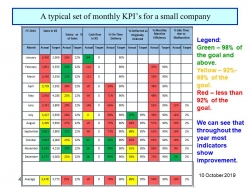Between Assertiveness and Authoritativeness
"I compromise and compromise until I get what I want". This is said to have been a policy of Levi Eshkol's, Israel's third prime-minister. It's a witty saying, attributed to a leader who was, by many accounts, not very assertive. He was made prime-minister due to pressure by Ben-Gurion, perhaps because the latter believed Eshkol would be easily guided, but a year later the two entered a fierce conflict and Eshkol refused to back down. He was prime-minister between 1963 and 1969, and in 1967, in the tense days leading up to the war, he didn't not inspire confidence in the public. A small mistake during an address to the nation created intense public pressure and he was forced to create a wide coalition and make Moshe Dayan the security minister.
And so, we see that despite his many accomplishments, he was unable to inspire confidence among the public. What did he lack?
Indecisive Managers
I assume you're familiar with indecisive managers. They're usually good people. They'll delegate to those under them, but won't monitor their KPI's or hold them accountable for goals. They find it difficult to resolve conflicts, and will put up with uncertainty under them. The real difficulty will happen when they have strong personalities as direct reports, who won't align with company goals and may work in opposing directions. Such managers are seen as weak and islands of undisciplined behavior and lack of attention to company policies could develop under their leadership. They also find it difficult to fire employees who aren’t suited to their role.
But, often, managers who aren’t assertive, who are indecisive, and can't fire employees, are well aware of the situation and their weaknesses. Eventually, it's very likely that a healthy company will develop under them. They're open to advice and hearing other opinions.
When working with such managers I know the best way to help is through KPI's and monitoring. That is, setting indicators and goals for each manager, meeting frequently, writing down all decisions - including a timeline and a responsible person for each - and monitoring progress.
Authoritative Managers
At the other end of the spectrum are authoritative managers. Dictionary.com defines authoritative as (among other things) "having an air of authority; accustomed to exercising authority; dictatorial". Often such managers will expect complete obedience and might create an oppressive work environment.
I define authoritative managers as ones who squash any initiative, don't delegate but hand out tasks, giving the managers under them long lists and monitoring them for task-completion instead of for goal-achievement. In addition, often such managers will be very blunt and nor respectful. Part of that lack of respect might manifest in calling a meeting, arriving late, and demanding to have the discussion from the start.
Stephen R. Covey writes in his book The 7 Habits of Highly Effective People about delegating. He differentiates between two types: delegating authority (as if to a delivery person) or delegating responsibility. The first type means: go perform a task and report to me when it's done. Delegating responsibility focuses on results, giving people free reign in choosing their methods and taking ownership of the results.
CEOs who give their employees a list of tasks instead of goals diminish them. Managers who are full of initiative and who are used to freedom in achieving goals will find it hard to adjust to an authoritative CEO. Often they'll end up leaving the company, or they'll withdrew and stop initiating. I'm afraid some of the readers, who have or have had such a manger, are sure I'm now describing them specifically and not a general type.
A Personal Story: What I Learnt about an Authoritative Professor from My Days as a Student at the Technion?
I think it happened during my second year of studies. I had a course called Stochastic Models. A difficult subject. The professor who taught it was seen as very tough and wouldn't tolerate any noise during class.
The night before the mid-term exam, my first pair of twins were born. The labor was long, and I think it was a quarter to seven in the morning by the time I left the hospital. I had just enough time to get to my apartment, change clothes, and hurry to campus. I waited for the professor at the classroom's entrance, and fearfully told him my son and daughter were born that night, and asked if I could sit the exam at a different time. The professor looked at me, lit up, and with a big smile congratulated me and sent me home to rest. From that time we became friendly. He would stop me for a chat whenever I passed by his office. I found a warm and pleasant person. He lacked confidence and felt threatened by the horde of student in class. The opportunity he had to connect with me was a blessing for him.
Since then, whenever I meet an authoritative manager, I ask - what is the weak point at the root of his behavior.
It's clear to me the authoritativeness is linked with lack of confidence the manager feels about their ability to lead the company to success. Sometimes it's to do with a desire to get all the credit for success, and of course with a lack of professionality in management. These managers' bluntness when dealing with direct reports disappears in other relationships.
The Results of Authoritative Management
At first results seem great. Especially when before the authoritative manager there was an indecisive one. Now decisions are made quickly and everybody falls in line. But this kind of management suffocates the company. It suppresses positive initiatives and when the authoritative CEO makes a mistake no one will dare correct them or point out the possible harm.
Rehabilitating a company after an authoritative CEO can take some time. Such a CEO can cause considerable damage to the management and personnel infrastructure of the company.
An authoritative manager certainly doesn't need outside advice. They fear looking weak by listening to a different opinion.
Which Type of Manager is Better: an Indecisive or Authoritative One?
The choice isn't only between the two models presented above, there is also a third option – the ideal CEO – which I'll discuss below. But if I must choose between these two extremes of the managerial spectrum – an indecisive CEO is preferable. Such a CEO will cause less damage, will be more open to other opinions, and when they'll make a mistake (as we all do at times) it will be possible to stop them. An authoritative CEO or manager leaves behind a managerial desert. Managers with initiative and drive can't function under an authoritative CEO, and will leave the company.
The Ideal Manager
The ideal manager works with goals and KPI's. They direct their employees to reach their goals by investigating the root causes for failures and creating corrective actions or a work-plan. The ideal manger is assertive on the one hand, and approachable on the other. They of course are respectful to all employees, and work to develop the managers under them.
Since none of us is perfect, the ideal manager remains a theoretical model. But we should strive towards it, and in any case, I recommend you beware of authoritative managers.
Summary and Recommendation
In the above article I presented two types of managers from two ends of a spectrum – the indecisive manager and the authoritative manager. At one end is a manager who finds it difficult to make decisions and to deal with direct reports when they disregard instructions. At the other is an authoritative manager who makes decisions quickly but is often disrespectful to those around. Such a manger gives tasks to direct reports instead of delegating.
As with any extreme situation, both examples have their disadvantages. Of the two I prefer indecisive managers, since they're more aware of reality and of their weaknesses and more open to change. Authoritative managers aren't aware of their weaknesses and aren’t as open to change. They can leave the company without anyone with initiative and drive.
How should you deal with such a situation?
I usually write with managers in mind, but managers who are in one of these two extremes will find it difficult to change on their own. This article could help those around them to shed light on the situation and direct them.
The ideal manager, in my view, is one who delegates and develops employees. They work with KPI's and goals according to company goals, and measure the progress of every manager under them.
If you are interested in my professional help, personally or for your company, the best way to contact me is to send a request through the Get in Touch form here.
Relevant Articles












 My First Book: Manage! Best Value Practices for Effective Management
My First Book: Manage! Best Value Practices for Effective Management